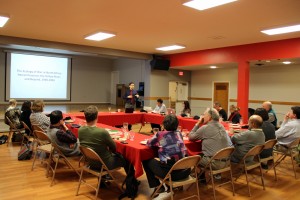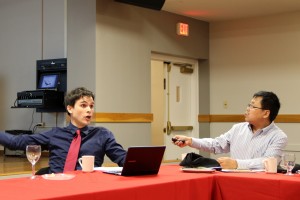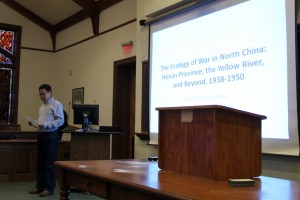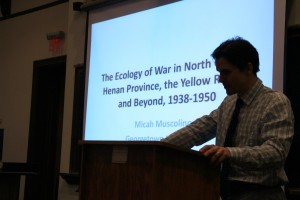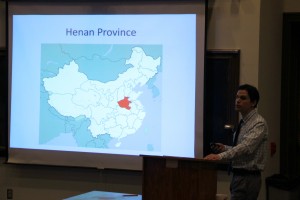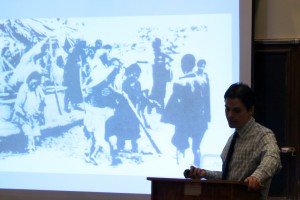On March 18th, 2014 faculty participated in a colloquium discussion with guest speaker Dr. Micah Muscolino on the topic “A Militarized River: The 1938 Yellow River Flood and its Aftermath.” Visiting scholar Professor Kelin Zhang provided an introduction to the fragile ecosystem of the Yellow river basin. Due to flooding caused by regular monsoons, the river basin has a tendency to flood frequently, but human intervention has caused even further damage on the fragile ecosystem. The river is a source of sustenance and danger for people residing in the river basin, as deforestation and erosion due to agriculture have caused floods which have destroyed the homes of several people.
Prof. Muscolino discussed the historical records of the flood and the use of the hydraulics and flooding in warfare during the late 1930s. He stressed the role the need for energy plays in shaping military campaigns, and how through hydraulic warfare, political elites put the power of the state over the welfare of the local people. After the end of the war the floods continued, causing shocks on the ecosystem. Additionally, Prof. Muscolino discussed his research process in writing his upcoming manuscript, and the role of existing records on river management in China.
Additionally, on March 19th, Prof. Muscolino gave a public presentation entitled “The Ecology of War in North China.” In this lecture, he spoke about the role of war in modern Chinese politics and culture, and its impact on the country’s environmental history. The lecture highlighted the ways in which war shapes human’s interactions with nature through the use of the Yellow River during and after World War II. As a source of energy, Japanese forces built dikes along the river. The Nationalists destroyed these dikes, flooding the surrounding area and upsetting the ecosystem and the agriculture. Prof. Muscolino also discussed debates around energy that were taking place and the semantics of the word “power” in Chinese. Finally, Prof. Muscolino explored the ensuing flood and famine in Henan Prefecture in 1942-1943 along with the resettlement and reconstruction that took place in the following years. Although human intervention had repeatedly damaged the already fragile ecosystem of the river basin through agriculture and wartime flooding, human assistance was also able to restore the land.


